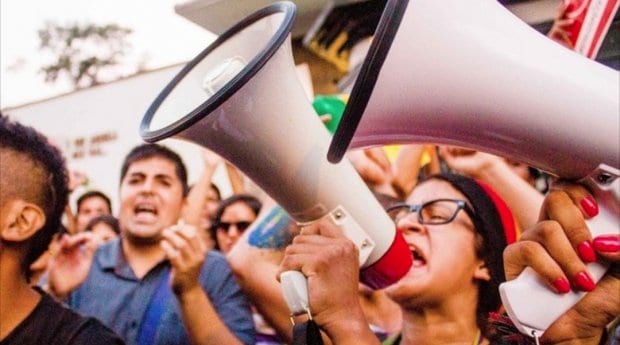Rewind just a few years and Cristián Cáceres wagers most Peruvians didn’t know the meaning of the word homophobe. Now, consider them well versed.
The term came in handy in March when bishop Luis Bambarén called gay congressman Carlos Bruce maricón or faggot, insisting gay was not a Peruvian word and that “the Peruvian word is faggot.”
Just a few days later it came in handy again when congressman Rubén Condori invoked Hitler’s Mein Kampf as motivation for voting down an attempt at legalizing same-sex civil unions, which he called a “covert” marriage.
A picture of Condori with his hand raised, overlaid with Hitler mid-heil, was published in the Peruvian newspaper El Comercio and soon widely shared; Condori promptly mocked.
With a broad smile, Cáceres says conservatives “have really hurt themselves.”
And then pointedly notes, “He literally quoted Hitler.”
Same-sex civil unions may have been rejected 7-4 (with two abstentions) in March by a Peruvian congressional committee, but it’s no longer uncommon to see same-sex couples holding hands in public, Cáceres says. In the months since the vote, the debate over equality is booming. Thousands of people shook the streets of Lima in April for the second-annual equality march and Cáceres says he’s never seen so many people at Pride as he saw in June.
“The media pay attention to a campaign for civil union or marriage equality more than a campaign for stopping discrimination,” he says. “They pay a lot more attention to it and then you can fight for it. You can fight to stop discrimination.”
The latest legal loss has done little to dampen the resolve of those fighting for change. If anything, the massive, nationwide conversation it’s prompted is spurring them forward.
The biggest barrier to change is what’s happening inside people’s heads, Cáceres says, and, “fighting for legal equality is a way to reach social equality.”
***
El Movimiento Homosexual de Lima calls itself Latin America’s oldest gay and lesbian organization. MHOL, as the Homosexual Movement of Lima is often referred to, began on the pacific coast in the Peruvian capital, one of South America’s largest cities, in 1982.
It was at first a place for self-awareness and acceptance, MHOL’s current executive director Giovanny Infante says, although it has since grown to be a national force in the push for equality, especially protection, for Peru’s lesbian, gay, bisexual and transgender populations.
A left-leaning congressman first attempted to legislate equality in 1993, more than two decades ago. He recommended Peru protect an individual’s right to choose their own sexual orientation and to choose, without exception, their own partners. His proposal to Congress was unsuccessful.
A decade later, there was a second unsuccessful attempt. In 2010, there was a third — this one critically viewed by MHOL as nothing more than a vote grab.
Congressman Bruce led the fourth attempt, a collaborative effort involving MHOL, among others. Unión Civil Ya, or Civil Union Now, the volunteer collective Cáceres belongs to, took up campaigning. “In our hands is the possibility of being happy,” they declared.
Congress received the proposal in September 2013. The wording was precise: they were seeking a law to establish same-sex civil unions, not marriage. To try to legalize marriage, Cáceres says, “would have been a lot harder.”
Indeed, in the 16-page proposal, civil unions are referred to repeatedly as “Unión Civil No Matrimonial” — “Civil Union Not Marriage.”
Bruce and other proponents sought, in part, through the bill to ensure that same-sex couples would be entitled to the same treatment as immediate family and heterosexual couples in areas such as domestic stability, private prison visits, equal treatment during medical appointments, and citizenship for your partner (if they’re a foreigner) after two years.
While the bill was rejected, a watered-down version is being pushed through Congress right now. The Justice and Human Rights Committee approved it in June.
Unión solidaria, or the solidarity union, is quite literally an attempt at solidarity over equality, Cáceres says. It would be an agreement between two people of the age of majority to make their life together. There is no explicit mention of same-sex partners.
Under the solidarity union, the partner would not get citizenship, they would not make private prison visits and they would not have the distinct marital status that civil unions would have afforded them.
In a debate published on El Comercio on June 19 over whether to approve the solidarity union or not, Infante focused his no vote on criticizing groups opposed to marriage equality. The bottom line isn’t the debate over which law would be better, he wrote, since any law at all could be considered progress as gay couples lack protection now. At issue, he wrote, is the “profound contempt” opposition groups have for the basic rights of LGBT persons.
Infante never believed civil unions would be approved in Peru, despite the rest of the continent moving towards marriage equality. Same-sex marriage is legal in Argentina, Brazil, and Uruguay, while same-sex civil unions are legal in Ecuador, Colombia, and Chile.
Even as he worked to help draft the civil unions bill, Infante was deeply skeptical that Peru’s congress would ever approve it.
A survey conducted by Ipsos in April 2014 found while only a third of Peruvians supported same-sex civil unions, almost 60 percent supported some of the rights the bill would have enshrined. Younger, more educated people “show greater openness to the topic,” Ipsos highlighted.
“We knew it did not have the possibility of getting approved,” Infante says, “but the community support was greater than we expected.”
He shares Cáceres’ view that legal equality will drive social equality.
“Initiatives, such as allowing civil unions, probably will not be approved during the next decade,” he estimates; regardless, they “help promote a public debate.”
***
The Catholic Church is sometimes jokingly referred to as Peru’s oldest political party. Religion has its tentacles in many aspects of Peruvian — and South American — life, including the long struggle for equality.
During the debate over legalizing same-sex civil unions, Catholic and evangelical leaders were prolific in their attacks. In a note published to the Catholic Church’s website, the Archbishop of Trujillo, one of Peru’s larger cities, “invited” the country’s “founding fathers to defend the inalienable values of marriage and family” and reject the proposal.
After three failed attempts, Archbishop Miguel Cabrejos Vidarte wondered, would congress’s time not be better spent on education, health care and poverty reduction, as well as fighting corruption and increasing public safety?
But in Peru, homophobia can kill and does so frequently. Infante estimates at least one person is murdered every week around the country because of it. MHOL documented as many instances of fatal homophobia as it could in 2014: Naomi, Enrique and Margarita murdered in January; Javier in February; Madeleine and Héctor in April; Maritza in June; Kristal in July; Naomi, Victor and Alberto in August; Ricardo in September; Vicky and Daniel in November.
A young man also committed suicide last November; his family said he was tormented because of his sexual orientation. And these are just the cases MHOL was able to document.
So while Infante supports the push for legal equality, he struggles with fitting Peru into what he calls the “global gay agenda” whose main points have become, he feels, “marriage and to raise awareness.”
Congress voted to keep “sexual orientation” out of laws against hate crimes in 2013, at least one congressman deeming such protection unnecessary. A report last year from “No Tengo Miedo, I’m Not Afraid,” documented widespread discrimination and violence against LGBT persons living in Lima.
Infante worries the international community is too fixated on Peru’s economic growth and its culture, less so on its human rights.
“Latin America should be heading a different direction,” he says, referring to the direction taken by more and more gay-marriage proponents worldwide. “The urgency is that people are being murdered . . . We have to focus on conditions that allow people to live, such as access to health care, education, housing, work, and protection against HIV and hate crimes.”


 Why you can trust Xtra
Why you can trust Xtra


